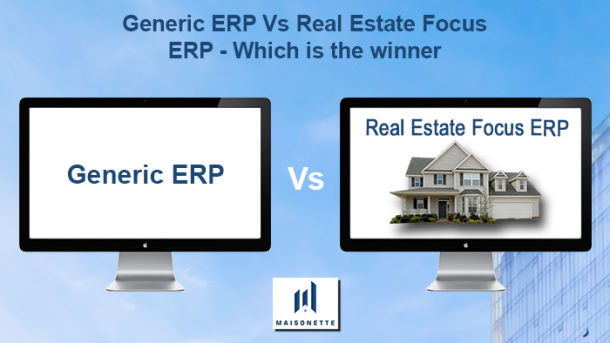Somewhere over the last couple of years, real estate industry has grown drastically, and there is a remarkable change in the internal and external business processes in the entire sector. In such a situation, it is crucial for any real estate business to be in tune with new technologies and solutions. To achieve optimum benefits of the change happening around, a real estate business requires world-class Real Estate ERP tool that focuses and is designed for the industry.
ERP software helps you seamlessly consolidate a variety of otherwise incompatible systems and information into a standard, highly integrated operating environment. Streamlining the business process and automating them, can deliver significant gains by improving efficiency throughout the enterprise and helping to grow revenue, increase productivity, and better manage costs. An ERP software can be customized and localized to virtually every language, currency, and global standard.
Implementing Real Estate ERP can increase revenue, profit and market share. By having an integrated solution, real estate companies can provide a better experience for customers, business partners, and even employees. A real estate focus ERP software can reduce the IT cost giving the company a benefit of identifying the new business model and create competitive advantage. Simultaneously, it will make it easy for the property managers and developers to drive real-time decisions with immediate insights and predictive analytics and increase business agility and accelerate innovation.
Why should you choose Real Estate Focus ERP? Why can’t you use a mainstream ERP?
Mainstream ERPs provided by market giants such as Oracle, SAP, and Microsoft are designed for medium to large scale companies with one or a few large general ledgers. Neither of these ERP solutions is designed for dozens or even hundreds of independent general ledgers that need to be reported on a fully or partially consolidated basis. Because no matter how powerful mainstream ERPs are, they can’t handle a relatively small volume of highly complex transactions that are generated by commercial real estate companies. Hence, real estate management software emerged back in 1970’s.
For instance, a daily task of posting of a stack of rent payments needs to be scheduled. Using a mainstream ERP software, you would have to log in and select a particular entity you want to post payments for, choose the function of posting payments, and update the record with the payment details. Now for updating the record for the next rent check, you would have to exit out of the previous entity and perform the entire steps again which makes the job tedious and less efficient.
Real Estate ERP gives the flexibility to cross objects within a function making it easy for the user to jump in and out of the entities and just select the function you want to perform and apply across entities at will. This architectural difference limits mainstream ERPs to corporate management within real estate operations. On the contrary, even though real estate management software have reliably tackled the more challenging property accounting feature, they lack the functionality and integration offered by the mainstream ERPs.
Several times mainstream ERPs have been attempted to displace property management functions, and companies have invested a good amount of capital to overcome the fundamental architectural differences that separated mainstream ERP with real estate focus ERP but all in vain. Though these attempts proved that there is a scope for mainstream ERPs have the capability but need a lot of new technicalities go before they can efficiently handle a relatively small volume of highly complex difficulties of the real estate model.
Many large real estate companies have implemented mainstream ERP for business operations and Real Estate ERP for property services to leverage the best of both worlds but it isn’t without its challenges and high costs. Though this approach sounds logical enough, there is extensive and intensive integration efforts as the real estate management functionality have to be incorporated into the overall ERP solution.
It has been observed lately that mainstream ERPs are reaching down into the industry by providing services that are real estate specific solutions. Simultaneously, real estate specific providers are incorporate the functionalities mainstream ERPs. For example, Maisonette financial solution automates 90% of core financial operations. Accounting team can now save time as they no longer need to do data entry or reviewing the accounts as it has already been defined in the system. These solutions are rapidly adopting part-and-parcel of the features that are in use on day to day basis earning their stripes and reaching across to become ERP platforms.
Can Real estate ERP software providers keep pace with industry demands?
It is essential to understand that when it comes to technology solutions, what might be perfect for one company may not work well for another. When it comes to technology, supply and demand are highly dependent on the different cultural currents, business requirements, and technical topographies of each real estate company.
Real Estate ERP software providers are broadening their industry capabilities to make the technology solutions more versatile, more attractive and more sophisticated. Real Estate ERP vendors are making all possible efforts to be the single point solution for every business process and technology requirements to attract a very lucrative and increasingly global real estate industry.

No Comments, Be The First!